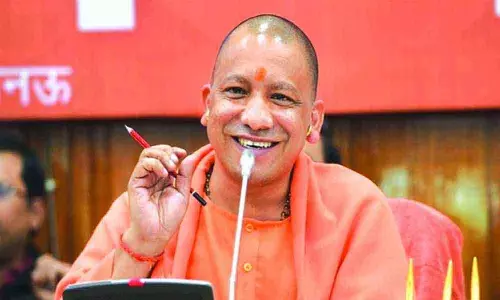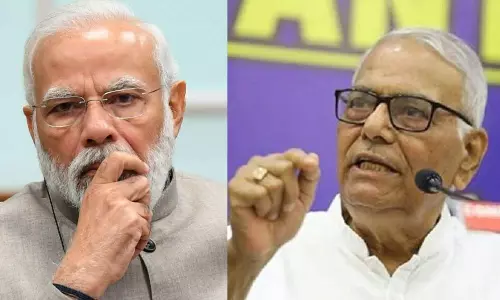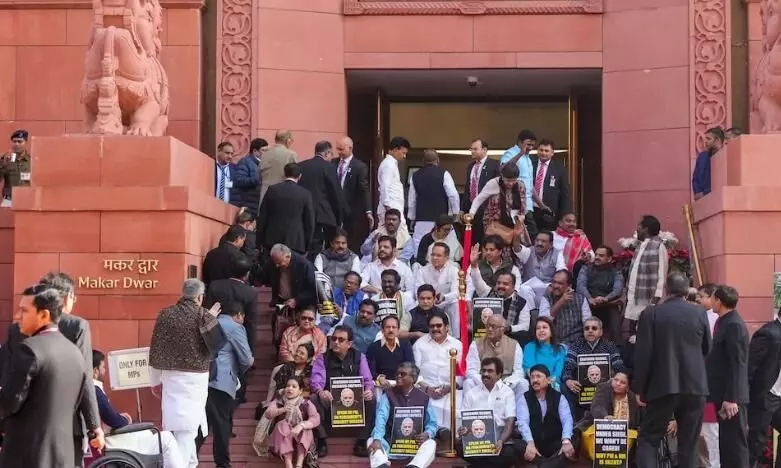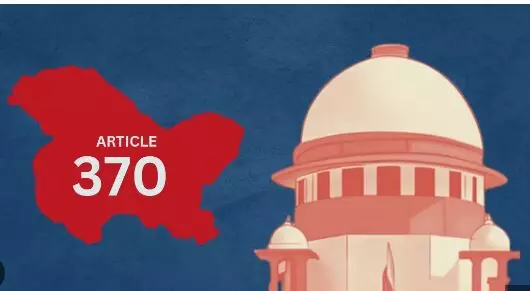
End of parliamentary democracy?
text_fieldsWith only three days left for the conclusion of the winter session of the 17th Lok Sabha, 141 MPs have been suspended in three phases, an all-time record in the history of Parliament. These opposition MPs have been expelled for allegedly obstructing the proceedings despite repeated requests from the Speaker. The majority of those expelled will no longer be able to attend the current session. Some who have been referred to the Privileges Committee will have to wait at least three months to get a decision about them. On December 13, when Parliament was in session, two persons who jumped from the visitor's gallery onto the Lok Sabha desks and detonated yellow smoke bombs shocked not only the members of the House but also the security personnel. Though the attackers were overpowered with force, opposition members interrupted the proceedings by demanding that Home Minister Amit Shah make a statement in the House about this terrorist incident which embarrassed the country. The ruling party insists on not accepting this demand and being satisfied with the statements of the Speakers of the Houses. It is an understandable concern and protest of the people's representatives that the Home Minister, who should have responded most authoritatively to the worrying security lapse in the supreme legislature, remained silent, and the Prime Minister took the time to speak to a media entity outside the house without taking the Parliament into confidence.
When the discussion, which must involve the members too, is deliberately avoided, the anxiety and protest of the members about the government's motive to shirk such discussions, is quite natural. The fact that the assailants planned to jump into the Lok Sabha using a pass obtained through a BJP Lok Sabha member from Karnataka makes the incident all the more mysterious. Those responsible are sitting comfortable by giving the reassuring statements that the government is working as it should, noting that some of the security officials have been detained and some others have been arrested on suspicion of being involved in the conspiracy of the terrorist group. But this step without taking the members of Parliament into confidence will surely not satisfy the nation. The fact that the 17th Lok Sabha has the dubious distinction of having the shortest sessions in the entire history of the Indian Parliament, which was established in 1952, should set those responsible thinking. Parliamentary democracy becomes worth its name when it uses the opportunity to express the views of the world's largest democracy on various issues to discuss national issues and frame laws in a timely manner. However, in retrospect, we cannot turn a blind eye to the fact that our parliamentary democracy is in decline. The 17th Lok Sabha sat for only 33 per cent of the 46 hours scheduled for the budget session; and Rajya Sabha, on the other hand, 24 per cent out of 32. This is the sixth budget session with the shortest time since 1952. No subject was discussed in the House in the last session. According to Article 93 of the Constitution, the Lok Sabha has to elect two members as Speaker and Deputy Speaker. Even as the term of the house is about to end, the position of Deputy Speaker is still lying vacant.
Is it because of not getting a suitable MP from NDA? If so, nothing can be more shameful. It is a common sight that the houses are adjourned or dissolved with noise as soon as they meet. As a result, even important bills prepared by the government are passed without discussion. A look at the history of each piece of legislation shows that even draconian laws have been passed in this manner. Even though some cases go to the Supreme Court, due to various reasons, justice is rare and often delayed. One of the latest tragic examples is the misfortune confronted by Article 370 of the Constitution, which provides special status to Jammu and Kashmir. Even the Supreme Court has given the green light to the arbitrary decision imposed by the Centre by turning the state into a Union Territory and suppressing the opposition voices. Moreover, court judgments have also cleared the way for the Centre to take over any state in whole or in part at its discretion, contradicting federalism. The Modi government has done the work without giving a chance for serious consideration and discussion in Parliament. Is the country heading to a fate of having to watch with pain the process of Indian democracy evolving, as observed by some foreign research institutes, into a 'dictatorship established through election'?



























